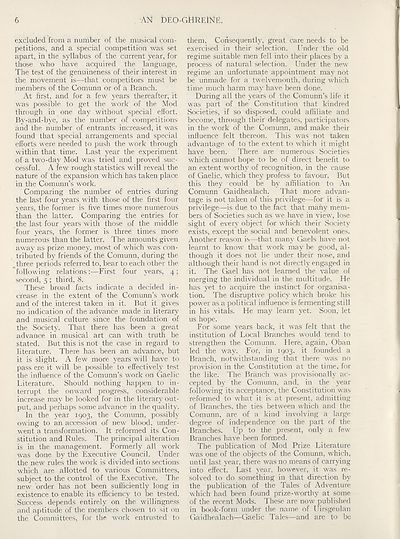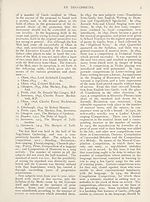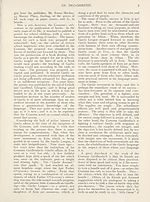An Comunn Gàidhealach Publications > Deo-gréine > Volume 1, October 1905-September 1906
(14) Page 6
Download files
Complete book:
Individual page:
Thumbnail gallery: Grid view | List view

6
AN DEO-GHREtNE.
excluded from a number of the musical com¬
petitions, and a special competition was set
apart, in the syllabus of the current year, for
those who have acquired the language,
The test of the genuineness of their interest in
the movement is—that competitors must be
members of the Comunn or of a Branch.
At first, and for a few years thereafter, it
was possible to get the work of the Mod
through in one day without special effort.
By-and-bye, as the number of competitions
and the number of entrants increased, it was
found that special arrangements and special
efforts were needed to push the work through
within that time. Last year the experiment
of a two-day Mod was tried and proved suc¬
cessful. A few rough statistics will reveal the
nature of the expansion which has taken place
in the Comunn’s work.
Comparing the number of entries during
the last four years with those of the first four
years, the former is five times more numerous
than the latter. Comparing the entries for
the last four years with those of the middle
four years, the former is three times more
numerous than the latter. The amounts given
away as prize money, most of which was con¬
tributed by friends of the Comunn, during the
Three periods referred to, bear to each other the
following relations:—First four years, 4;
second, 5 ; third, 8.
These broad facts indicate a decided in¬
crease in the extent of the Comunn’s work
and of the interest taken in it. But it gives
no indication of the advance made in literary
and musical culture since the foundation of
the Society. That there has been a great
advance in musical art can with truth be
stated. But this is not the case in regard to
literature. There has been an advance, but
it is slight. A few more years will have to
pass ere it will be possible to effectively test
the influence of the Comunn’s work on Gaelic
Literature. Should nothing happen to in¬
terrupt the onward progress, considerable
increase may be looked for in the literary out¬
put, and perhaps some advance in the quality.
In the year 1903, the Comunn, possibly
owing to an accession of new blood, under¬
went a transformation. It reformed its Con¬
stitution and Rules. The principal alteration
is in the management. Formerly all work
was done by the Executive Council. Under
the new rules the work is divided into sections
which are allotted to various Committees,
subject to the control of the Executive. The
new order has not been sufficiently long in
existence to enable its efficiency to be tested.
Success depends entirely on the willingness
and aptitude of the members chosen to sit on
the Committees, for the work entrusted to
them. Consequently, great care needs to be
exercised in their selection. Under 'the old
regime suitable men fell into their places by a
process of natural selection. Under the new
regime an unfortunate appointment may not
be unmade for a twelvemonth, during which
time much harm may have been done.
During all the years of the Comunn’s life it
was part of the Constitution that kindred
Societies, if so disposed, could affiliate and
become, through their delegates, participators
in the work of the Comunn, and make their
influence felt thereon. This was not taken
advantage of to the extent to which it might
have been. There are numerous Societies
which cannot hope to be of direct benefit to
an extent worthy of recognition, in the cause
of Gaelic, which they profess to favour. But
this they could be by affiliation to An
Comunn Gaidhealach. That more advan¬
tage is not taken of this privilege—for it is a
privilege—is due to the fact that mahy mem¬
bers of Societies such as we have in view, lose
sight of every object for which their Society
exists, except the social and benevolent ones.
Another reason is—that many Gaels have not
learnt to know that work may be good, al¬
though it does not lie under their nose, and
although their hand is not directly engaged in
it. The Gael has not learned the value of
merging the individual in the multitude. He
has yet to acquire the instinct for organisa¬
tion. The disruptive policy which broke his
power as a political influence is fermenting still
in his vitals. He may learn yet. Soon, let
us hope.
For some years back, it was felt that the
institution of Local Branches would tend to
strengthen the Comunn. Here, again, Oban
led the way. For, in 1903, it founded a
Branch, notwithstanding that there was no
provision in the Constitution at the time, for
the like. The Branch was provisionally ac¬
cepted by the Comunn, and, in the year
following its acceptance, the Constitution was
reformed to what it is at present, admitting
of Branches, the ties between which and the
Comunn, are of a kind involving a large
degree of independence on the part of the
Branches. Up to the present, only a few
Branches have been formed.
The publication of Mod Prize Literature
was one of the objects of the Comunn, which,
until last year, there was no means of carrying
into effect. Last year, however, it was re¬
solved to do something in that direction by
the publication of the Tales of Adventure
which had been found prize-worthy at some
of the recent Mods. These are now published
in book-form under the name of Uirsgeulan
Gaidhealach—Gaelic Tales—and are to be
AN DEO-GHREtNE.
excluded from a number of the musical com¬
petitions, and a special competition was set
apart, in the syllabus of the current year, for
those who have acquired the language,
The test of the genuineness of their interest in
the movement is—that competitors must be
members of the Comunn or of a Branch.
At first, and for a few years thereafter, it
was possible to get the work of the Mod
through in one day without special effort.
By-and-bye, as the number of competitions
and the number of entrants increased, it was
found that special arrangements and special
efforts were needed to push the work through
within that time. Last year the experiment
of a two-day Mod was tried and proved suc¬
cessful. A few rough statistics will reveal the
nature of the expansion which has taken place
in the Comunn’s work.
Comparing the number of entries during
the last four years with those of the first four
years, the former is five times more numerous
than the latter. Comparing the entries for
the last four years with those of the middle
four years, the former is three times more
numerous than the latter. The amounts given
away as prize money, most of which was con¬
tributed by friends of the Comunn, during the
Three periods referred to, bear to each other the
following relations:—First four years, 4;
second, 5 ; third, 8.
These broad facts indicate a decided in¬
crease in the extent of the Comunn’s work
and of the interest taken in it. But it gives
no indication of the advance made in literary
and musical culture since the foundation of
the Society. That there has been a great
advance in musical art can with truth be
stated. But this is not the case in regard to
literature. There has been an advance, but
it is slight. A few more years will have to
pass ere it will be possible to effectively test
the influence of the Comunn’s work on Gaelic
Literature. Should nothing happen to in¬
terrupt the onward progress, considerable
increase may be looked for in the literary out¬
put, and perhaps some advance in the quality.
In the year 1903, the Comunn, possibly
owing to an accession of new blood, under¬
went a transformation. It reformed its Con¬
stitution and Rules. The principal alteration
is in the management. Formerly all work
was done by the Executive Council. Under
the new rules the work is divided into sections
which are allotted to various Committees,
subject to the control of the Executive. The
new order has not been sufficiently long in
existence to enable its efficiency to be tested.
Success depends entirely on the willingness
and aptitude of the members chosen to sit on
the Committees, for the work entrusted to
them. Consequently, great care needs to be
exercised in their selection. Under 'the old
regime suitable men fell into their places by a
process of natural selection. Under the new
regime an unfortunate appointment may not
be unmade for a twelvemonth, during which
time much harm may have been done.
During all the years of the Comunn’s life it
was part of the Constitution that kindred
Societies, if so disposed, could affiliate and
become, through their delegates, participators
in the work of the Comunn, and make their
influence felt thereon. This was not taken
advantage of to the extent to which it might
have been. There are numerous Societies
which cannot hope to be of direct benefit to
an extent worthy of recognition, in the cause
of Gaelic, which they profess to favour. But
this they could be by affiliation to An
Comunn Gaidhealach. That more advan¬
tage is not taken of this privilege—for it is a
privilege—is due to the fact that mahy mem¬
bers of Societies such as we have in view, lose
sight of every object for which their Society
exists, except the social and benevolent ones.
Another reason is—that many Gaels have not
learnt to know that work may be good, al¬
though it does not lie under their nose, and
although their hand is not directly engaged in
it. The Gael has not learned the value of
merging the individual in the multitude. He
has yet to acquire the instinct for organisa¬
tion. The disruptive policy which broke his
power as a political influence is fermenting still
in his vitals. He may learn yet. Soon, let
us hope.
For some years back, it was felt that the
institution of Local Branches would tend to
strengthen the Comunn. Here, again, Oban
led the way. For, in 1903, it founded a
Branch, notwithstanding that there was no
provision in the Constitution at the time, for
the like. The Branch was provisionally ac¬
cepted by the Comunn, and, in the year
following its acceptance, the Constitution was
reformed to what it is at present, admitting
of Branches, the ties between which and the
Comunn, are of a kind involving a large
degree of independence on the part of the
Branches. Up to the present, only a few
Branches have been formed.
The publication of Mod Prize Literature
was one of the objects of the Comunn, which,
until last year, there was no means of carrying
into effect. Last year, however, it was re¬
solved to do something in that direction by
the publication of the Tales of Adventure
which had been found prize-worthy at some
of the recent Mods. These are now published
in book-form under the name of Uirsgeulan
Gaidhealach—Gaelic Tales—and are to be
Set display mode to:
![]() Universal Viewer |
Universal Viewer | ![]() Mirador |
Large image | Transcription
Mirador |
Large image | Transcription
| An Comunn Gàidhealach > An Comunn Gàidhealach Publications > Deo-gréine > Volume 1, October 1905-September 1906 > (14) Page 6 |
|---|
| Permanent URL | https://digital.nls.uk/125242080 |
|---|
| Description | Leabhar 1, An deicheamh mios 1, 1905 gu Mios Meadhonach an Fhoghair 1906. |
|---|---|
| Attribution and copyright: |
|
| Description | This contains items published by An Comunn, which are not specifically Mòd-related. It includes journals, annual reports and corporate documents, policy statements, educational resources and published plays and literature. It is arranged alphabetically by title. |
|---|
| Description | A collection of over 400 items published by An Comunn Gàidhealach, the organisation which promotes Gaelic language and culture and organises the Royal National Mòd. Dating from 1891 up to the present day, the collection includes journals and newspapers, annual reports, educational materials, national Mòd programmes, published Mòd literature and music. |
|---|---|
| Additional NLS resources: |
|

